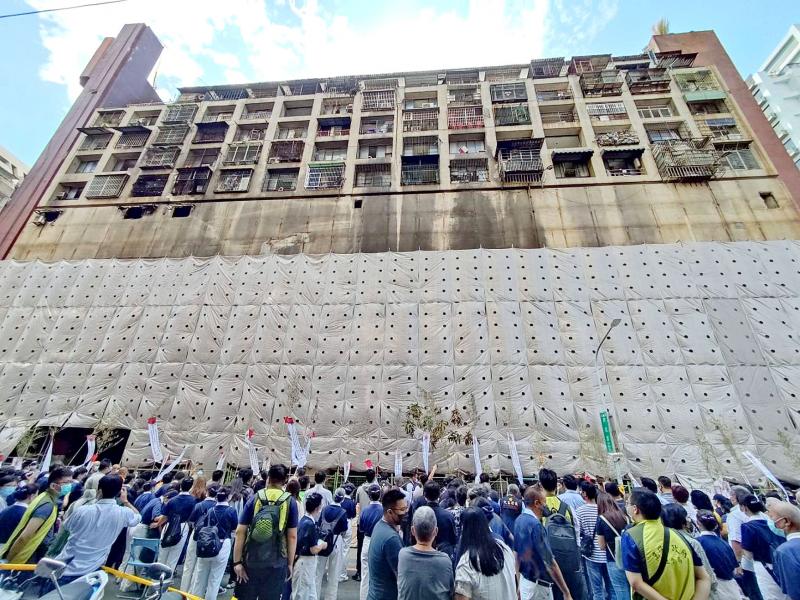President Tsai Ing-wen (蔡英文) yesterday pledged to reform the nation’s building regulations, two days after a fire in Kaohsiung killed 46 people.
The death toll from the fire at the 13-story Cheng Chung Cheng (城中城) building in the early hours of Thursday was the second-highest in Taiwan’s history, behind a February 1995 blaze at the Weierkang Club in Taichung that killed 64.
Speaking after visiting those injured in the fire at the 40-year-old Kaohsiung building, Tsai said that building safety regulations were lax, adding that she had instructed the Cabinet to propose plans to improve the safety of all properties while facilitating urban renewal plans.

Photo: Huang Chia-lin, Taipei Times
She said that government agencies should work with local authorities to reinforce fire safety inspections in older buildings, as well as ramp up efforts to facilitate government-led projects aimed at redeveloping older buildings and neighborhoods.
The most pressing issue is a thorough check of all mixed-use buildings in Taiwan, especially those partially abandoned and in a state of disrepair, and attending to problems within buildings that pose a public safety risk, she said.
The Urban Renewal Act (都市更新條例) states that the central or a local government can plan and implement a redevelopment project to renovate or reconstruct one or several buildings in a designated area.
However, in part due to complex property rights issues, projects involving older buildings often progress slowly.
On Friday, Minister of the Interior Hsu Kuo-yung (徐國勇) said that his ministry is considering amending the law to make it mandatory for all buildings to establish a management committee.
The ministry said that the committees are responsible for building repairs, maintenance and safety, as stipulated in the Condominium Administration Act (公寓大廈管理條例) promulgated in 1995.
However, the law does not apply to the 18,000 mixed-use buildings in the nation’s six special municipalities that were built before 1995, Hsu said.
Although local authorities have since encouraged the establishment of management committees in such buildings, 7,000 to 8,000 still do not have one, he added.
The ministry’s proposed amendment would mandate that all condominiums, regardless of whether they were constructed before 1995, must establish a management committee, Hsu said.
The proposed amendment would take into consideration that business sections of the building should contribute a portion of the management fee, he added.
Hsu also said that the proposed amendments would address loopholes such as buildings not being required to file public safety notices with the local government if the commercial section of the building is vacant, and buildings under 16 floors being exempt from filing public safety reports.

Taiwan is stepping up plans to create self-sufficient supply chains for combat drones and increase foreign orders from the US to counter China’s numerical superiority, a defense official said on Saturday. Commenting on condition of anonymity, the official said the nation’s armed forces are in agreement with US Admiral Samuel Paparo’s assessment that Taiwan’s military must be prepared to turn the nation’s waters into a “hellscape” for the Chinese People’s Liberation Army (PLA). Paparo, the commander of the US Indo-Pacific Command, reiterated the concept during a Congressional hearing in Washington on Wednesday. He first coined the term in a security conference last

Prosecutors today declined to say who was questioned regarding alleged forgery on petitions to recall Democratic Progressive Party (DPP) legislators, after Chinese-language media earlier reported that members of the Chinese Nationalist Party (KMT) Youth League were brought in for questioning. The Ministry of Justice Investigation Bureau confirmed that two people had been questioned, but did not disclose any further information about the ongoing investigation. KMT Youth League members Lee Hsiao-liang (李孝亮) and Liu Szu-yin (劉思吟) — who are leading the effort to recall DPP caucus chief executive Rosalia Wu (吳思瑤) and Legislator Wu Pei-yi (吳沛憶) — both posted on Facebook saying: “I

Sung Chien-liang (宋建樑), who led efforts to recall Democratic Progressive Party (DPP) Legislator Lee Kun-cheng (李坤城), was released on bail of NT$80,000 today amid outcry over his decision to wear a Nazi armband to questioning the night before. Sung arrived at the New Taipei District Prosecutors’ Office for questioning in a recall petition forgery case last night wearing a red armband bearing a swastika, carrying a copy of Adolf Hitler’s Mein Kampf and giving a Nazi salute. Sung left the building at 1:15am without the armband and covering the book with his coat. Lee said today that this is a serious

A mountain blaze that broke out yesterday morning in Yangmingshan National Park was put out after five hours, following multi agency efforts involving dozens of fire trucks and helicopter water drops. The fire might have been sparked by an air quality sensor operated by the National Center for High-Performance Computing, one of the national-level laboratories under the National Applied Research Laboratories, Yangmingshan National Park Headquarters said. The Taipei City Fire Department said the fire, which broke out at about 11am yesterday near the mountainous Xiaoyoukeng (小油坑) Recreation Area was extinguished at 4:32pm. It had initially dispatched 72 personnel in four command vehicles, 16